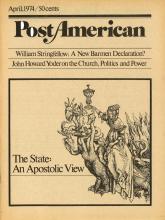We know from experience that Scripture painfully confronts each of us in one or more areas of our lives. We do not feel that any of us is exempt from God’s judgment. Yet, nonetheless, we feel called to speak prophetically in this situation.
We have noted from the media that the Hearst family professes a belief in God and regularly attends church. On the one hand, we wish to express our compassion for the deep suffering that they are undergoing. But, on the other hand, given their professed belief, we feel it is necessary to ask: why have they not submitted to the Lordship of Christ in their lives in the matter of wealth? Why have they not done what Jesus commands them to do as one of his would-be wealthy followers--that is, give their riches to serve the poor?
Jesus said to the rich young man who came to Him seeking eternal life:
If you would be perfect, go, sell what you possess and give to the poor, and you will have treasure in heaven; and come, follow me. (Matthew 19:21)
He went on to say to his disciples:
Truly, I say to you, it will be hard for a rich man to enter the kingdom of heaven. Again I tell you, it is easier for a camel to go through the eye of a needle than for a rich man to enter the kingdom of God...With men this is impossible, but with God all things are possible. (Matthew 19:23-26)
Read the Full Article

